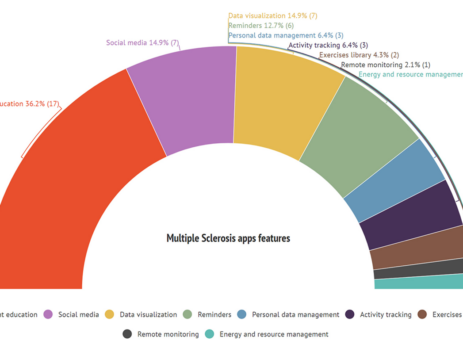We assessed how well mobile health apps meet the needs of people with multiple sclerosis (MS). From a systematic review of app stores, we identified 30 apps focused on MS. While many offered patient education and data visualization, critical features like energy management, remote monitoring, and gamification were largely absent. Our findings suggest that current MS mHealth apps fall short of addressing the specific challenges and needs of MS patients.
What was the context of our study?
Multiple sclerosis (MS) is a chronic disease that affects the central nervous system and impacts over 2 million people worldwide. MS symptoms can significantly reduce quality of life, requiring patients to manage their health actively. mHealth apps hold the potential to support these patients by offering tools for symptom monitoring, education, and self-management. However, little is known about whether available MS-focused apps meet the specific needs of patients.
What did we do?
We conducted a systematic search in the Google Play and Apple App Stores for MS-related apps, applying scoping review methods. A total of 581 apps were initially identified, and 30 unique apps met our inclusion criteria. We reviewed these apps for their purpose, features, and developer backgrounds, focusing on how well they addressed previously identified needs of people with MS.
What did we find?
The majority of apps focused on patient education and disease management. Many apps provided general disease information and tools for managing treatment. Features like energy management and remote monitoring (critical for MS patients) were present in only one app each. Gamification elements, which can improve user engagement, were also rare. Development gaps: Most apps were created by small-to-medium enterprises or pharmaceutical companies, with limited involvement from healthcare professionals or nonprofit organizations, raising concerns about content reliability.
Why is this important?
Our findings highlight significant gaps in the design of MS-focused mHealth apps. Addressing these gaps through collaboration between patients, healthcare professionals, and developers can lead to tools that better support the unique challenges faced by people with MS. Improved app features like fatigue management, personalization, and gamification could enhance engagement and long-term usability.
Reference
Giunti G, Guisado Fernández E, Dorronzoro Zubiete E, Rivera Romero O. Supply and Demand in mHealth Apps for Persons With Multiple Sclerosis: Systematic Search in App Stores and Scoping Literature Review. JMIR Mhealth Uhealth. 2018;6(5):e10512. https://doi.org/10.2196/10512.

